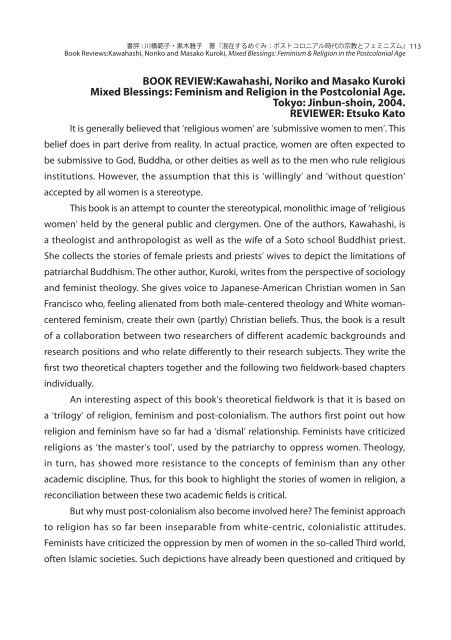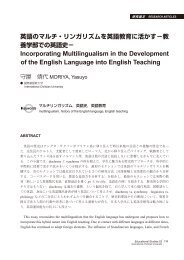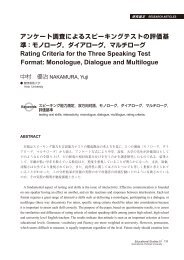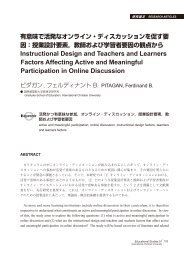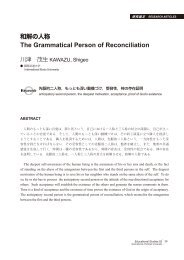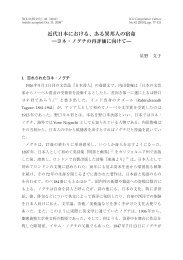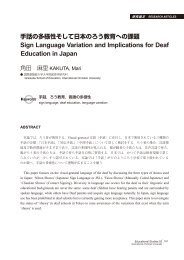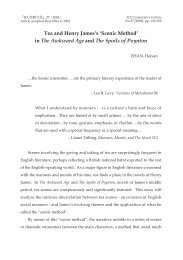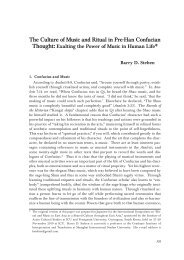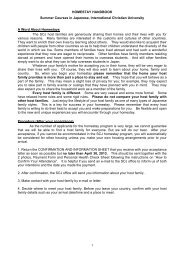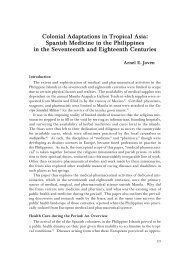Untitled - subsite - å½éåºç£æ大å¦
Untitled - subsite - å½éåºç£æ大å¦
Untitled - subsite - å½éåºç£æ大å¦
You also want an ePaper? Increase the reach of your titles
YUMPU automatically turns print PDFs into web optimized ePapers that Google loves.
: 113<br />
Book Reviews:Kawahashi, Noriko and Masako Kuroki, Mixed Blessings: Feminism & Religion in the Postcolonial Age<br />
BOOK REVIEW:Kawahashi, Noriko and Masako Kuroki<br />
Mixed Blessings: Feminism and Religion in the Postcolonial Age.<br />
Tokyo: Jinbun-shoin, 2004.<br />
REVIEWER: Etsuko Kato<br />
It is generally believed that religious women are submissive women to men. This<br />
belief does in part derive from reality. In actual practice, women are often expected to<br />
be submissive to God, Buddha, or other deities as well as to the men who rule religious<br />
institutions. However, the assumption that this is willingly and without question<br />
accepted by all women is a stereotype.<br />
This book is an attempt to counter the stereotypical, monolithic image of religious<br />
women held by the general public and clergymen. One of the authors, Kawahashi, is<br />
a theologist and anthropologist as well as the wife of a Soto school Buddhist priest.<br />
She collects the stories of female priests and priests wives to depict the limitations of<br />
patriarchal Buddhism. The other author, Kuroki, writes from the perspective of sociology<br />
and feminist theology. She gives voice to Japanese-American Christian women in San<br />
Francisco who, feeling alienated from both male-centered theology and White womancentered<br />
feminism, create their own (partly) Christian beliefs. Thus, the book is a result<br />
of a collaboration between two researchers of different academic backgrounds and<br />
research positions and who relate differently to their research subjects. They write the<br />
first two theoretical chapters together and the following two fieldwork-based chapters<br />
individually.<br />
An interesting aspect of this books theoretical fieldwork is that it is based on<br />
a trilogy of religion, feminism and post-colonialism. The authors first point out how<br />
religion and feminism have so far had a dismal relationship. Feminists have criticized<br />
religions as the masters tool, used by the patriarchy to oppress women. Theology,<br />
in turn, has showed more resistance to the concepts of feminism than any other<br />
academic discipline. Thus, for this book to highlight the stories of women in religion, a<br />
reconciliation between these two academic fields is critical.<br />
But why must post-colonialism also become involved here The feminist approach<br />
to religion has so far been inseparable from white-centric, colonialistic attitudes.<br />
Feminists have criticized the oppression by men of women in the so-called Third world,<br />
often Islamic societies. Such depictions have already been questioned and critiqued by


